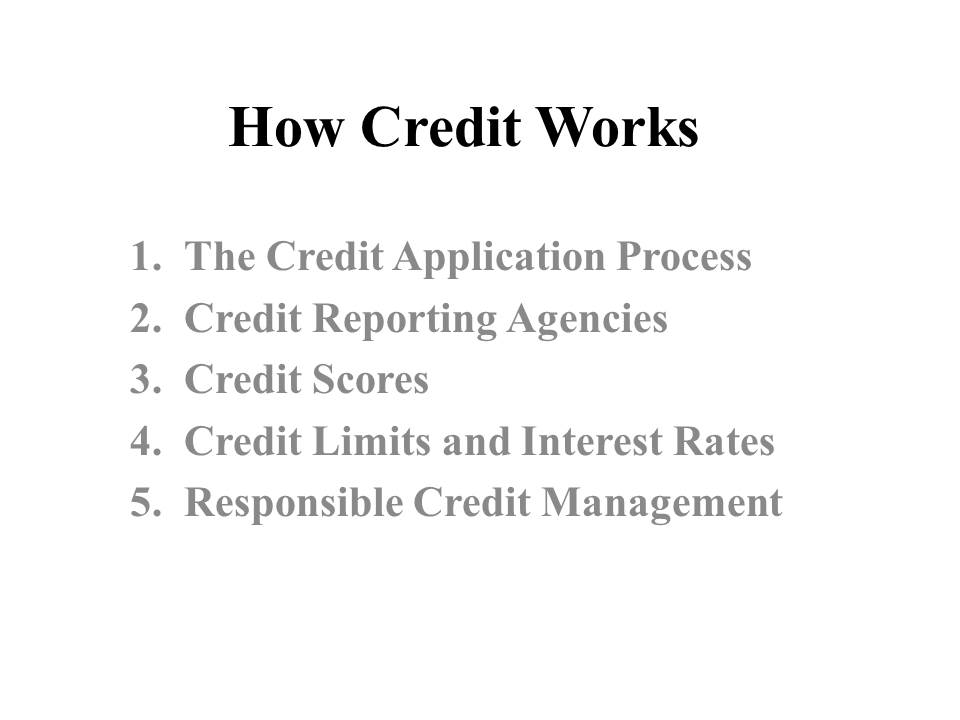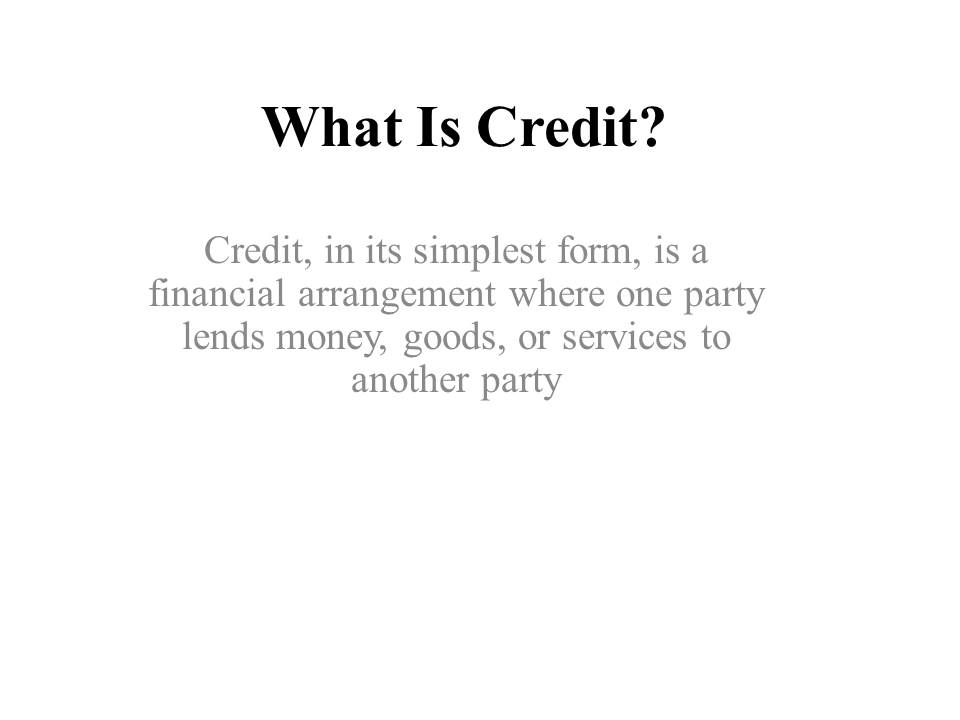Introduction
In the modern world, credit plays a fundamental role in the financial lives of individuals and businesses. From buying a home to starting a small business, credit is an essential tool that enables us to access the things we need and want, even when we don’t have the cash on hand. But what exactly is credit, and how does it work? In this comprehensive guide, we’ll delve deep into the world of credit, exploring its definition, types, importance, and how it functions in various aspects of our lives.
Table of Contents
- Understanding Credit
- 1.1 What Is Credit?
- 1.2 The History of Credit
- Types of Credit
- 2.1 Revolving Credit
- 2.2 Installment Credit
- 2.3 Open Credit
- 2.4 Closed Credit
- The Importance of Credit
- 3.1 Economic Impact
- 3.2 Personal Finance Impact
- How Credit Works
- 4.1 The Credit Application Process
- 4.2 Credit Reporting Agencies
- 4.3 Credit Scores
- 4.4 Credit Limits and Interest Rates
- 4.5 Responsible Credit Management
- Credit in Daily Life
- 5.1 Credit Cards
- 5.2 Mortgages
- 5.3 Auto Loans
- 5.4 Personal Loans
- Credit and Business
- 6.1 Business Credit
- 6.2 Business Loans
- 6.3 Credit for Small Businesses
- Credit and Your Financial Future
- 7.1 Building and Rebuilding Credit
- 7.2 Credit and Investments
- 7.3 Credit and Retirement Planning
- The Dark Side of Credit
- 8.1 Credit Mismanagement
- 8.2 Credit and Debt
- 8.3 Credit Repair and Counseling
- Conclusion
1. Understanding Credit
1.1 What Is Credit?
Credit, in its simplest form, is a financial arrangement where one party lends money, goods, or services to another party with the expectation that the borrower will repay the lender in the future. It represents trust and a commitment to repay the borrowed amount, typically with interest. Credit transactions are a cornerstone of the modern economy, facilitating various financial activities, from purchasing a home to financing education.
1.2 The History of Credit
To understand how credit works today, it’s essential to trace its historical roots. Credit has been a part of human economic interaction for centuries. Ancient civilizations, such as the Mesopotamians and Egyptians, engaged in credit-based systems. They utilized credit to trade goods and livestock, recording transactions on clay tablets.
The concept of interest, a critical element in credit, has a long history as well. The ancient Code of Hammurabi, one of the earliest legal codes, regulated interest rates on loans. As societies evolved, so did the sophistication of credit systems. The Medici family in Renaissance Italy, for example, is often credited with developing modern banking, including the use of promissory notes.
In the modern era, credit systems expanded alongside industrialization and globalization, giving rise to the complex financial networks and institutions we see today.

what is credit
2. Types of Credit
Credit comes in various forms, each tailored to specific needs and situations. Understanding these types is crucial to making informed financial decisions.
2.1 Revolving Credit
Revolving credit allows borrowers to access a pre-approved amount of credit continuously. Credit cards are a common example of revolving credit. With a credit card, you have a credit limit, and you can borrow and repay funds within that limit as long as you make minimum monthly payments. Interest is charged on the outstanding balance.
2.2 Installment Credit
Installment credit involves borrowing a specific amount of money for a predetermined period. The borrower agrees to make regular, fixed payments until the debt is fully repaid. Examples include auto loans, personal loans, and mortgages.
2.3 Open Credit
Open credit is similar to revolving credit but typically involves a shorter borrowing period and higher interest rates. A common example is a store credit account, where you can make purchases and repay the balance over a short time frame.
2.4 Closed Credit
Closed credit is issued for a specific purpose and often cannot be used for other expenses. A common example is a student loan, which can only be used to pay for educational expenses.
3. The Importance of Credit
Understanding the importance of credit is crucial for making informed financial decisions. Credit impacts both the individual and the broader economy.
3.1 Economic Impact
Credit plays a vital role in economic growth. It allows businesses to expand, invest, and innovate. Additionally, it provides consumers with the purchasing power to buy homes, cars, and other goods and services, which stimulates economic activity.
3.2 Personal Finance Impact
On a personal level, credit can affect your ability to achieve financial goals. A good credit history can lead to lower interest rates on loans, higher credit limits, and better insurance premiums. It can also influence your ability to rent an apartment or land a job, as employers and landlords often check credit reports.
4. How Credit Works
To understand how credit works, we need to examine the processes involved, including credit applications, reporting agencies, credit scores, and responsible credit management.
4.1 The Credit Application Process
When you apply for credit, whether it’s a credit card, loan, or mortgage, the lender assesses your creditworthiness. They consider factors such as your income, credit history, and outstanding debts to determine whether to approve your application.
4.2 Credit Reporting Agencies
Credit reporting agencies, also known as credit bureaus, collect and maintain credit information on individuals and businesses. The three major credit bureaus in the United States are Equifax, Experian, and TransUnion. Lenders use these agencies’ reports to evaluate a borrower’s creditworthiness.
4.3 Credit Scores
A credit score is a numerical representation of your creditworthiness. FICO scores, the most widely used, range from 300 to 850, with higher scores indicating better creditworthiness. Lenders use credit scores to assess the risk of lending to a particular borrower and to determine the interest rate on loans.
4.4 Credit Limits and Interest Rates
Lenders set credit limits based on a borrower’s creditworthiness. Higher credit scores often result in higher credit limits. Interest rates, on the other hand, can vary depending on the borrower’s credit history and the type of credit being offered.
4.5 Responsible Credit Management
Responsible credit management involves using credit wisely and making timely payments. This not only helps maintain good credit but also saves money by avoiding high-interest charges and penalties.

5. Credit in Daily Life
Credit is an integral part of daily life, impacting various aspects, including personal finance, homeownership, transportation, and more.
5.1 Credit Cards
Credit cards are one of the most common forms of credit used for everyday purchases. They offer convenience and rewards but also come with the risk of high-interest rates if not managed responsibly.
5.2 Mortgages
A mortgage is a long-term installment loan used to finance the purchase of a home. It allows individuals and families to become homeowners, but it requires careful consideration due to its significant financial implications.
5.3 Auto Loans
Auto loans enable people to purchase vehicles. Like mortgages, they come with fixed terms and interest rates, making it essential to shop around for the best deals.
5.4 Personal Loans
Personal loans are versatile loans that can be used for various purposes, such as consolidating debt, funding home improvements, or covering unexpected expenses.
6. Credit and Business
Credit plays a crucial role in the business world, influencing everything from startup financing to ongoing operations.
6.1 Business Credit
Businesses have their own credit profiles, separate from the personal credit of the business owner. Building strong business credit can help secure financing and establish credibility.
6.2 Business Loans
Businesses often rely on loans to fund expansion, purchase inventory, or cover operational expenses. Understanding business loans and their terms is essential for business owners.
6.3 Credit for Small Businesses
Small businesses, in particular, can benefit from credit lines and loans to sustain and grow their operations. Government programs and financial institutions offer various options for small business financing.
7. Credit and Your Financial Future
Credit has a long-term impact on your financial future, influencing everything from your ability to secure loans to your retirement planning.
7.1 Building and Rebuilding Credit
Maintaining good credit or working to improve a low credit score is essential for achieving financial goals. Strategies for building and rebuilding credit include making timely payments, reducing debt, and checking your credit report regularly.
7.2 Credit and Investments
Credit can intersect with investment decisions. For example, good credit can lead to better mortgage rates for real estate investments, while margin accounts allow investors to borrow against their investment portfolios.
7.3 Credit and Retirement Planning
The financial decisions you make throughout your life, including those related to credit, can impact your ability to retire comfortably. Managing debt and saving wisely are critical components of retirement planning.
8. The Dark Side of Credit
While credit offers numerous benefits, it also comes with risks, and mismanagement can lead to financial distress.
8.1 Credit Mismanagement
Credit mismanagement includes making late payments, maxing out credit cards, and taking on too much debt. These behaviors can lead to damaged credit and financial hardship.
8.2 Credit and Debt
Excessive debt can become overwhelming, making it essential to manage credit wisely and seek assistance if faced with unmanageable debt.
8.3 Credit Repair and Counseling
Credit repair services and counseling are available to help individuals address credit issues and develop strategies for improving their credit profiles.
9. Conclusion
In the complex world of finance, credit is a powerful tool that can open doors or lead to financial challenges. Understanding what credit is, how it works, and how it impacts various aspects of our lives is essential for making informed decisions and achieving financial success. By managing credit responsibly and using it to your advantage, you can build a brighter financial future for yourself and your family.
